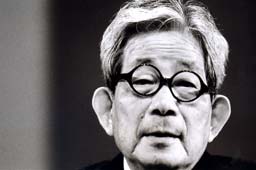
Kenzaburô Ôe
- Japan
- Zu Gast beim ilb: 2005
Kenzaburô Ôe was born the son of a landowning family in the small town Ôse on the Japanese island Shikoku in 1935. He studied French Literature until 1959 at the University of Tokyo and concluded his studies with a thesis on Sartre. During the course of his studies he published his first literary works, which were quickly acclaimed. In 1958, for his novel »Shiiku« (1958; Eng. »The Catch«, 1959), Ôe received the most highly esteemed award in Japan, the Akutagawa Prize. Growing up in the Japanese province and turning towards European culture was significantly formative for Ôe. Separating himself from nationalistic trends and the Tenno-Culture he developed a widely diverse interest in Western philosophy, literature, and mysticism. In 1960 he married his wife Yukari, with whom he has three children. In 1963 his son Hikari was born mentally handicapped, a circumstance that changed Ôe’s life completely. In his novel »Kojintekina taiken« (1964; Eng. »A Personal Matter«, 1968) – which received international acclaim – his fictional alter ego is put in the position of deciding whether he should kill his handicapped newborn child or let him live. Further themes, which Ôe explores in his novels, are similarly tied to autobiographical experiences – for example, life in a small isolated town at the time of Japanese capitulation after World War II. The protagonists of his novels are anti-heroes: mostly the same age as the author, living through existential crises, plagued by despair, loneliness, and sexual estrangement. The unique characteristic of Ôe’s many-layered art lies in the contrast of the despairing condition of his characters with a willful black humour, behind which even in the darkest of hours there shines forth a belief in humanity.
In the seventies and eighties, Ôe took up a number of international lecture and conference tours, which also reflect his commitment to the political realm; since the sixties Ôe has been a member of the Japanese Anti-Atom Movement, and he took part in the International Environment and Peace movement. Ôe, who once compared the role of the writer with that of the canary in a coal mine, is regarded as the »moral conscience« of his country, and in his homeland he is confronted by strong, conservative opponents.
In 1994, after the conclusion of his trilogy »Moeagaru midori no ki« (t: part I: Until the savior is stricken, 1993; part II: The swinging vacillation, 1994; part III: A flaming green tree, 1995), Ôe announced that thenceforth he would dedicate himself to the work of Spinoza and would stop writing. A few weeks later he was awarded the Nobel Prize for Literature, at which time he put his previous project to rest. Since then Ôe has worked on a novel sequence for which he again uses autobiographical material as a foundation. Recently appearing in German translation was »Tagame. Berlin – Tokyo« (2005), the first volume. Ôe lives in Setagaya, a suburb west of Tokyo.
Translator: Nora Bierich
© international literature festival berlin
Die Brüder Nedokoro
Suhrkamp
Frankfurt/Main, 1980
Übersetzung: Rainer und Ingrid Rönsch
Der stumme Schrei
Fischer
Frankfurt/Main, 1994
Übersetzung: Rainer Rönsch
Verwandte des Lebens
bebra
Berlin, 1994
Übersetzung: Jaqueline Berndt, Hiroshi Yamane
Stolz der Toten
Fischer
Frankfurt/Main, 1994
Übersetzung: Margarete Donath, Itsuko Gelbrich
Und plötzlich stumm
Aufbau
Berlin, 1994
Übersetzung: Jürgen Berndt, Eiko Saito-Berndt
Therapiestation
bebra
Berlin, 1995
Übersetzung: Verena Werner
Gestern, vor 50 Jahren
[mit Günther Grass]
Steidl
Göttingen, 1995
Übersetzung: Otto Putz
Der Tag, an dem Er selbst mir die Tränen abgewischt
Suhrkamp
Frankfurt/Main, 1995
Übersetzung: Siegfried Schaarschmidt
Reißt die Knospen ab
Suhrkamp
Frankfurt/Main, 1997
Übersetzung: Otto Putz
Stille Tage
Insel
Frankfurt/Main 2000
Übersetzung: Ursula Gräfe, Wolfgang Schlecht
Grüner Baum in Flammen
Suhrkamp
Frankfurt/Main, 2000
Übersetzung: Annelie Ortmanns
Eine persönliche Erfahrung
Suhrkamp
Frankfurt/Main, 2000
Übersetzung: Annelie Ortmanns
Der Fang
Suhrkamp
Frankfurt/Main, 2001
Übersetzung: Tatsuji Iwabuchi
Der schwarze Ast
Fischer
Frankfurt/Main, 2002
Übersetzung: Nora Bierich
Der kluge Regenbaum
Fischer
Frankfurt/Main, 2003
Übersetzung: Buki Kim, Siegfried Schaarschmidt, Ingrid Rönsch
Der atemlose Stern
Fischer
Frankfurt/Main, 2003
Übersetzung: Nora Bierich
Tagame. Berlin – Tokyo
Fischer
Frankfurt/Main, 2005
Übersetzung: Nora Bierich
Übersetzer: Nora Bierich, Buki Kim, Amelie Ortmanns, Siegfried Schaarschmidt
